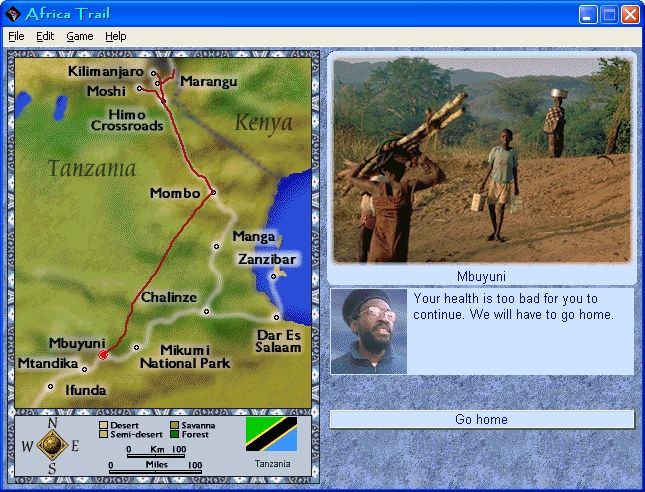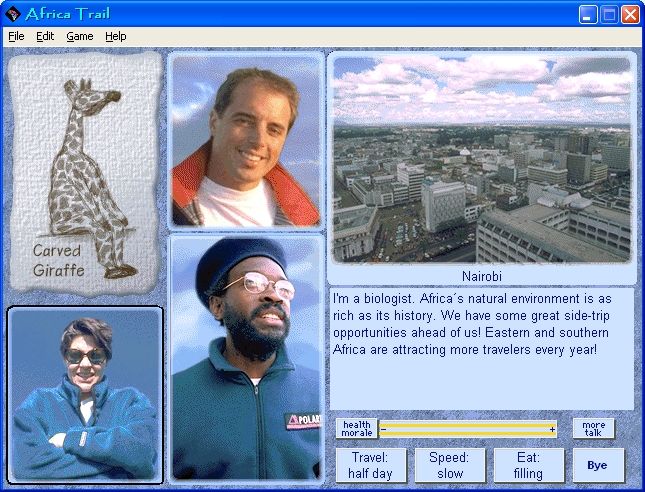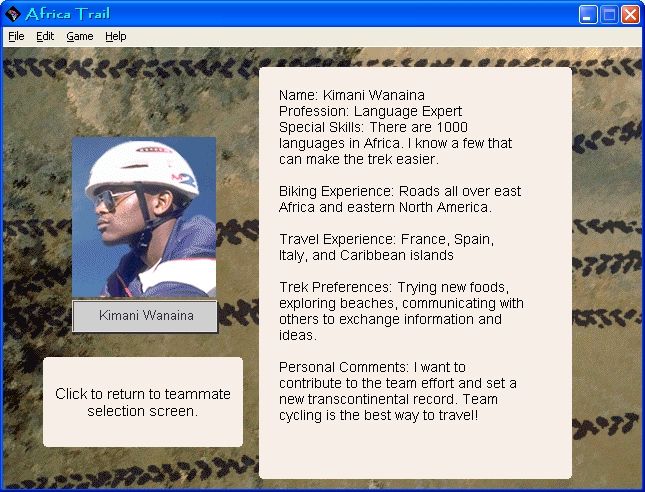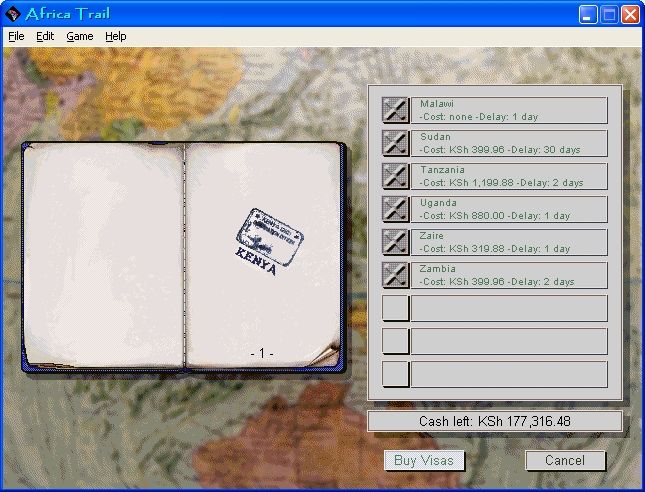Retro Replay Review
Gameplay
Africa Trail places you in the role of a cycling expedition leader tasked with guiding four riders on a cross-continental journey toward Cape Agulhas. Your first major decision is assembling your team: each potential companion brings distinct strengths and weaknesses, from mechanical aptitude to cultural sensitivity. The choices you make here ripple throughout the rest of your adventure, affecting repair times, negotiation with locals, and even the morale of your group when supplies run low.
(HEY YOU!! We hope you enjoy! We try not to run ads. So basically, this is a very expensive hobby running this site. Please consider joining us for updates, forums, and more. Network w/ us to make some cash or friends while retro gaming, and you can win some free retro games for posting. Okay, carry on 👍)
Resource management forms the backbone of the experience. Every mile ridden consumes food rations, water, and the cyclist’s endurance. You’ll need to constantly weigh the cost of spare parts for your bicycle—brake pads, tires, chains—against the necessity of purchasing visas and local guides. Running out of funds can strand you in remote regions, forcing difficult trade-offs between pressing on and retracing your steps to safer towns.
On the road, random events and decision points keep each playthrough fresh. You might encounter a festival in Burkina Faso that boosts your team’s spirit, or find yourself negotiating with border officials whose fees vary based on your chosen route. The pacing is deliberately measured: you’ll spend time plotting stops on a map, calculating daily distances, and adjusting gear before setting off at dawn. All of these mechanics work in concert to deliver a deeply strategic, organically unfolding simulation of real-world travel challenges.
Though the interface is straightforward—clicking between menus for supplies, stats, and maps—the depth emerges from juggling multiple priorities. Veteran expedition fans will appreciate the nuance in optimizing your bike’s loadout, while newcomers can rely on in-game hints to avoid catastrophic breakdowns. With trial and error, you’ll learn to read weather reports, account for terrain difficulty, and even decide when to rest or push through fatigue.
Graphics
Visually, Africa Trail leans into a stylized, map-centric presentation rather than high-fidelity 3D. The world unfolds on a series of illustrated travel maps, each region rendered with iconic landmarks: the Nile River snaking through Egypt, the jungles of the Congo Basin, and the towering Drakensberg Mountains of South Africa. While not visually cutting-edge by modern standards, these hand-drawn scenes evoke the diversity of African landscapes in a charming, educational manner.
Character sprites of your cyclists are small but expressive—sporting backpacks, helmets, and colorful jerseys—as they pedal along winding routes. Animations are simple yet functional, highlighting breakdown animations when your bike fails or celebratory poses when you reach a milestone. The interface employs clear icons for resources, making it easy to glance at your food, money, and spare-part inventories without sifting through text-heavy menus.
The UI design strikes a balance between information density and readability. Your daily logbook shows distance traveled, money spent, and cultural facts you’ve unlocked, all in a well-organized layout. Pop-up windows deliver brief historical and anthropological tidbits—complete with period photographs or simple illustrations—that reinforce the game’s educational goals without halting the action for long.
Subtle audio cues—such as the clatter of gears or the murmur of a village market—enhance immersion without overshadowing the strategic focus. While there’s no flashy particle system or real-time lighting, the game’s visual style remains consistent with its teaching mission, ensuring players stay focused on the challenges ahead.
Story
Africa Trail’s narrative is less about scripted cutscenes and more about the emergent story you create with each decision. Your overarching mission—to cycle from your starting point across multiple countries until you finally reach Cape Agulhas—is interwoven with smaller episodic tales. Whether you’re helping villagers repair a water pump or joining a local wedding procession, these vignettes illuminate the rich tapestry of modern African life.
Character interactions form the heart of the story. Your chosen teammates will reveal personal backgrounds and motivations as they conquer grueling mountain passes or navigate desert heat. Occasionally, you’ll field their concerns—balancing their desire for comfort against the urgency of your goal. Over long stretches of open road, these interpersonal moments give weight to mechanical tasks like replacing a punctured tube or rationing the last of your snacks.
The educational narrative is seamlessly woven into travel logs. After each leg of your adventure, a debriefing page presents cultural insights—covering everything from traditional musical instruments in Mali to the impact of wildlife conservation in Tanzania. Far from feeling like dry textbook entries, these asides are triggered by the regions you’ve crossed, making the context feel earned and directly relevant to your journey.
While there’s no central antagonist, nature itself provides dramatic tension. Unpredictable weather, unpaved roads, and occasional health scares keep you on your toes. The slow buildup—rising from dusty savannas to the windswept Cape—fosters a genuine sense of accomplishment when you finally glimpse the Southern Ocean’s shore.
Overall Experience
Africa Trail is a rare blend of educational simulation and strategy gameplay, delivering both insight into African geography and the thrill of expedition planning. It caters to families, educators, and solo adventurers seeking a mental challenge over reflex-driven gameplay. By emphasizing thoughtful resource management and cultural discovery, it stands out in a market saturated with high-octane action titles.
Patience is key: your first run may end in staff shortages or unplanned detours, but each failure teaches valuable lessons about budgeting, route selection, and risk assessment. Once you’ve mastered the basics, you’ll discover hidden routes, bargain with border officials, and strike the perfect balance between speed and safety. These successes carry a special weight precisely because they’re built on careful planning and in-game learning.
The educational dividends are significant. Players come away not only with a sense of global geography but also a nuanced appreciation for the day-to-day challenges faced by travelers and locals alike. Teachers can integrate the game into social studies curricula, while parents will appreciate the constructive blend of fun and learning.
Although it may feel dated in presentation, Africa Trail’s core design remains timeless. If you crave an experience that rewards patience, strategic thinking, and curiosity about the wider world, this journey through the heart of Africa is well worth undertaking.
 Retro Replay Retro Replay gaming reviews, news, emulation, geek stuff and more!
Retro Replay Retro Replay gaming reviews, news, emulation, geek stuff and more!









Reviews
There are no reviews yet.